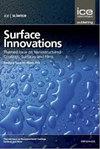Ni nanoparticles modified Cu nanowires for enhanced electrocatalytic nitrate removal
IF 3.5
4区 材料科学
Q3 CHEMISTRY, PHYSICAL
引用次数: 1
Abstract
Cu-based materials have been extensively studied for nitrate removal as an inexpensive and abundant electrocatalyst for water purification via the nitrate reduction reaction (NO3RR). But it typically suffers from nitrite accumulation due to the high selectivity towards nitrite formation. To address this issue, we herein report a strategy of modifying Cu nanowires with Ni nanoparticles to improve the NO3RR performance. The Ni nanoparticles both facilitate electron transfer from Ni to Cu and enhance the conversion of nitrite, thereby improving the overall removal of nitrate with a minimal yield of nitrite. Through a facile liquid phase deposition process, the loading amount of Ni nanoparticles can be easily tailored by simply changing the concentration of precursors, and the best Cu/Ni molar ratio for nitrate removal performance is 20. Under this ratio, the material simultaneously delivers a high nitrate removal rate of 92.2% and a low nitrite selectivity of only 2.2% at –0.9 V vs. reversible hydrogen electrode, accompanied with superior stability for a continuous NO3RR. This study thus offers an efficient, stable, and low-cost Cu-Ni bimetallic catalyst for NO3RR.Ni纳米粒子修饰Cu纳米线增强电催化去除硝酸盐的研究
铜基材料作为一种廉价且丰富的电催化剂,通过硝酸盐还原反应(NO3RR)净化水,已被广泛研究用于去除硝酸盐。但由于对亚硝酸盐形成的高选择性,它通常会受到亚硝酸盐积累的影响。为了解决这个问题,我们在此报道了一种用Ni纳米颗粒修饰Cu纳米线以提高NO3RR性能的策略。Ni纳米颗粒既促进了从Ni到Cu的电子转移,又增强了亚硝酸盐的转化,从而以最小的亚硝酸盐产率提高了硝酸盐的整体去除率。通过简单的液相沉积工艺,可以通过简单地改变前体的浓度来容易地调节Ni纳米颗粒的负载量,并且去除硝酸盐性能的最佳Cu/Ni摩尔比为20。在该比例下,该材料同时具有92.2%的高硝酸盐去除率和仅2.2%的低亚硝酸盐选择性(-0.9) V与可逆氢电极的比较,伴随着连续NO3RR的优异稳定性。因此,本研究为NO3RR提供了一种高效、稳定、低成本的Cu-Ni双金属催化剂。
本文章由计算机程序翻译,如有差异,请以英文原文为准。
求助全文
约1分钟内获得全文
求助全文
来源期刊

Surface Innovations
CHEMISTRY, PHYSICALMATERIALS SCIENCE, COAT-MATERIALS SCIENCE, COATINGS & FILMS
CiteScore
5.80
自引率
22.90%
发文量
66
期刊介绍:
The material innovations on surfaces, combined with understanding and manipulation of physics and chemistry of functional surfaces and coatings, have exploded in the past decade at an incredibly rapid pace.
Superhydrophobicity, superhydrophlicity, self-cleaning, self-healing, anti-fouling, anti-bacterial, etc., have become important fundamental topics of surface science research community driven by curiosity of physics, chemistry, and biology of interaction phenomenon at surfaces and their enormous potential in practical applications. Materials having controlled-functionality surfaces and coatings are important to the manufacturing of new products for environmental control, liquid manipulation, nanotechnological advances, biomedical engineering, pharmacy, biotechnology, and many others, and are part of the most promising technological innovations of the twenty-first century.
 求助内容:
求助内容: 应助结果提醒方式:
应助结果提醒方式:


